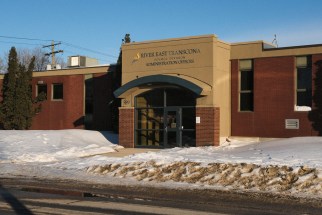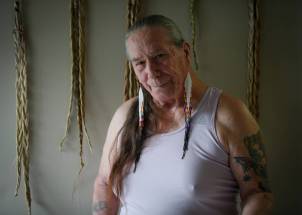Lost and found A past filled with abuse provided the lessons Charlotte Nolin needed to transform into the woman she is today
Read this article for free:
or
Already have an account? Log in here »
To continue reading, please subscribe:
Monthly Digital Subscription
$1 per week for 24 weeks*
- Enjoy unlimited reading on winnipegfreepress.com
- Read the E-Edition, our digital replica newspaper
- Access News Break, our award-winning app
- Play interactive puzzles
*Billed as $4.00 plus GST every four weeks. After 24 weeks, price increases to the regular rate of $19.95 plus GST every four weeks. Offer available to new and qualified returning subscribers only. Cancel any time.
Monthly Digital Subscription
$4.99/week*
- Enjoy unlimited reading on winnipegfreepress.com
- Read the E-Edition, our digital replica newspaper
- Access News Break, our award-winning app
- Play interactive puzzles
*Billed as $19.95 plus GST every four weeks. Cancel any time.
To continue reading, please subscribe:
Add Free Press access to your Brandon Sun subscription for only an additional
$1 for the first 4 weeks*
*Your next subscription payment will increase by $1.00 and you will be charged $16.99 plus GST for four weeks. After four weeks, your payment will increase to $23.99 plus GST every four weeks.
Read unlimited articles for free today:
or
Already have an account? Log in here »
Hey there, time traveller!
This article was published 30/05/2022 (1375 days ago), so information in it may no longer be current.
The first time Charlotte Nolin met her birth mother, it was Christmas 1966 and she was 16 years old.
Nolin, a ’60s Scoop survivor taken from her family when she was only six months old, had navigated her childhood through the child welfare system, alone and unaware she had a family.
At one point, a foster parent told her that her parents had died in a car accident. Nobody ever mentioned that she, the youngest of eight, had siblings. It was a social worker who eventually connected her to her brothers and sisters, many already adults.
“My mom came over to my sister’s place for Christmas dinner… and as she was coming up the sidewalk, my older sister goes, ‘Oh god, here comes our drunken mother.’ ‘Cause mom had an alcohol problem, the same as dad,” Nolin recalls.
“When she came in, she looked at me — I was sitting on the couch — and she says to my sister, ‘Who’s that?’ My sister got angry and goes, ‘Don’t you even recognize your own son?’”
“When she came in, she looked at me – I was sitting on the couch – and she says to my sister, ‘Who’s that?’ My sister got angry and goes, ‘Don’t you even recognize your own son?’”– Charlotte Nolin
The moment was jarring for both, but Nolin, who identified as a boy back then, quickly came to her mother’s defence. After all, she said, how would their mother recognize her, since Nolin was an infant the last time they were together.
“My mom just broke down.”
Charlotte Nolin is an Oji-Cree, Métis, two-spirit knowledge keeper, sun dancer, pipe carrier and elder. Her story is a remarkable journey of perseverance, of gender discovery, of recovery.
Nolin wasn’t adopted when she was taken from her family. Instead, as a ward of the child welfare system, she moved through a handful of foster homes in St. Malo, Letellier, Lorette and St. Pierre Jolys, attending day school and working as a farmhand for the families who fostered her.
Her childhood was often lonely, fraught with isolation and abuse. She would find refuge in the bush, along the Rat River. It was the one place where nobody hurt her.
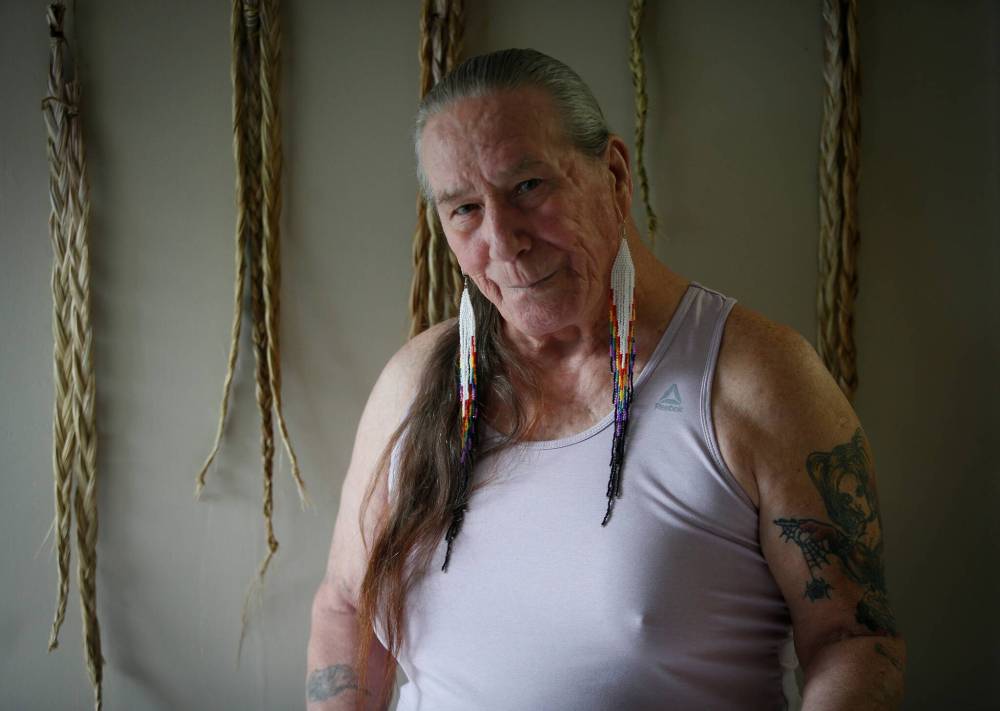
“Today, if things get heavy or stressful, I jump in the truck and I head out into the bush. To me there’s so much serenity that comes from sitting near a lake or a river, and I didn’t realize at the time when I was a child sitting in the bush that my relatives were teaching me. The beavers that lived in the river. The muskrats that lived in the river. The deer that would be walking in the bush. I’d just be sitting there and these animals would be teaching me their different footprints.”
Growing up in the francophone communities, Nolin always knew she was Indigenous. She was different from the families she stayed with, and they, as well as the nuns and priests at the day school, made that clear.
“I was made aware that I was a savage — that’s what they referred to me as,” she says.
Her voice is steady, though quiet at times. When she speaks about the past, she does it slowly and carefully, almost as though she is reliving that moment. Her eyes stare away into a place nobody else can see.
One of those places is Letellier. Nolin was eight when she moved in with a family there.
“I remember the first day I met the man of the house; he was a farmer,” Nolin says. “I was in the car with his wife, and he got in the car — I was sitting in the back seat — and I said, ‘Hi, I’m your new son,’ and he says, ‘You’re not my son.’”
“I was made aware that I was a savage – that’s what they referred to me as.”– Charlotte Nolin
They made it clear from the beginning that Nolin was an inconvenience. She says she suffered physical abuse while living in the home.
One spring day, when Nolin was about 12, she and the farmer’s son, who was a few years younger, ran away. They trekked through the brush along the Red River, making tracks in the soft earth under their feet. The pair took a break at an abandoned farmhouse, where they sat on the roof, watching the road to their home about a quarter of a mile in the distance.
“I wanted to go back to St. Pierre, where that woman (a former foster mom) had been beating me, because in my eyes it wasn’t as bad as where I was,” Nolin says.
The two children found an old wooden table in the farmhouse, which they figured they could use as a raft to row across the river, using branches as paddles.
“As soon as we took the table to the edge of the river, the current took it out about ten feet and it sank,” Nolin says. “Today, I acknowledge that it was the grandmothers and the grandfathers that held us back — ‘cause they wouldn’t have found our bodies.”
The two walked another couple of miles along the riverbank until they happened upon a neighbouring farmer, who called Nolin’s foster dad to come pick them up.
“The first thing he said to me was, ‘You don’t like living with us, do you?’ and I said no,” Nolin says. “That was it. We got in the car and went back. He told us to go sit down to eat some supper and I said no and I went to bed. I hated this man for what he did to me.
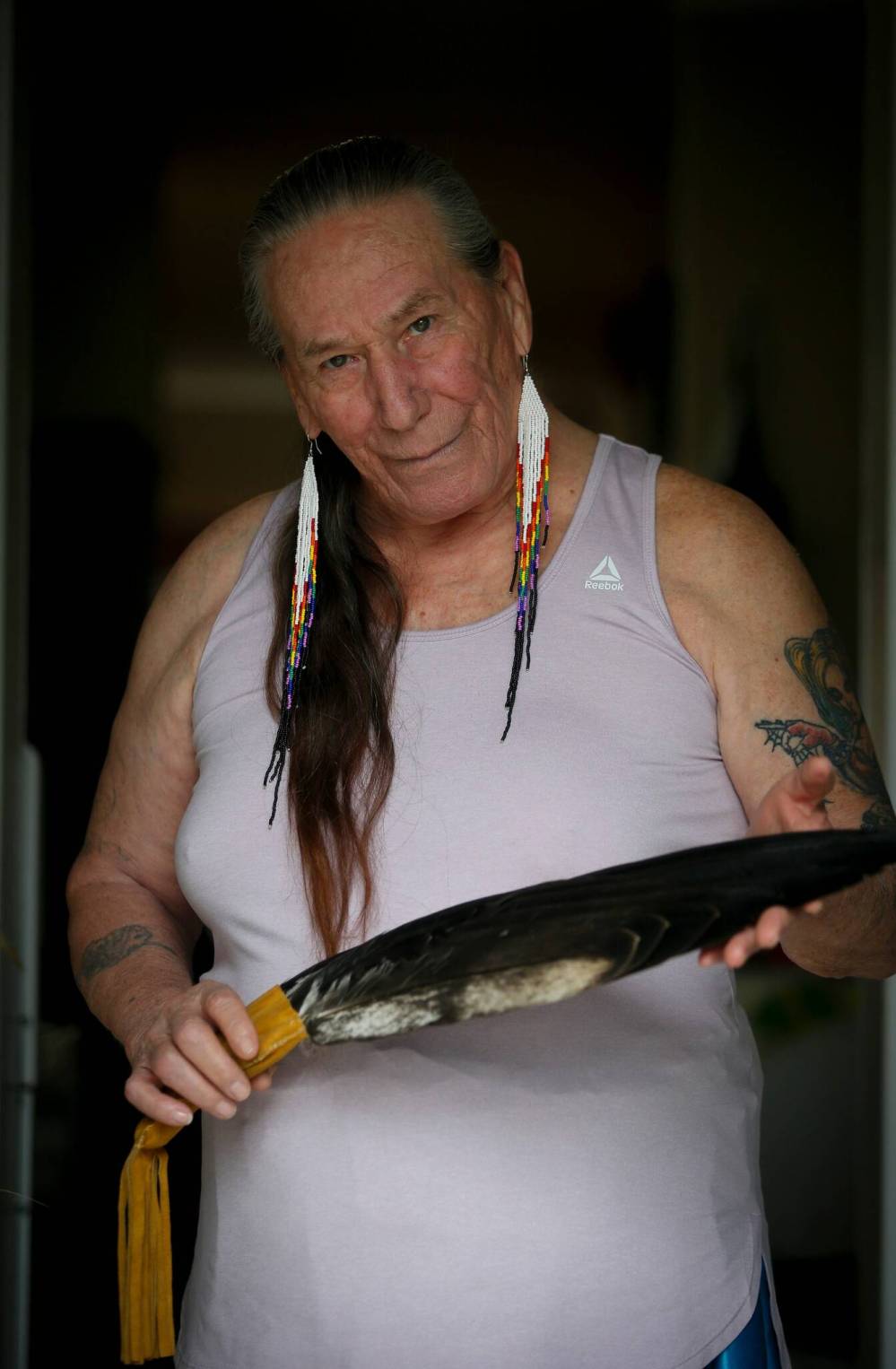
“Later on, I realized that all these foster homes, they were all farms, where I lived. We were nothing but chattel. Free labour. They got paid for looking after us and they got free labour out of us.”
Hauling bales and manure, cleaning the barn, hand-washing the floors, weeding the garden. It was a stack of endless chores.
“How did I survive? I’ve asked myself that many times.” She pauses. “I just did.”
Nolin was placed in one final foster home, with a family she says was good to her. She stayed there until she was 16 before moving to a Winnipeg group home. At the age of 17, she came out of the closet as two-spirit for the first time.
“I knew I was different when I was about eight years old. I was bullied and beat up because I was different. When I was 17 and I was in the group home, I decided that I was going to live as a woman. Because I had no skills to get employment or anything like that, I made the choice to start working the streets.”
Nolin lived out as a woman until she was 23. However, she went back into the closet because of the violence she faced as a two-spirit woman.
“There’s very little documentation of our existence, but there is some documentation that we were here hundreds of years ago,” Nolin says. “For me being two-spirit, it’s not a physical thing. It’s not a mental thing, it’s not an emotional thing. It’s a spiritual thing. We’ve been chosen to be different. We’ve been chosen to receive gifts (from Creator) that we need to share with our community.”
“For me being two-spirit, it’s not a physical thing. It’s not a mental thing, it’s not an emotional thing. It’s a spiritual thing.”– Charlotte Nolin
Some of the gifts are roles, such as being a leader in ceremony, or being a medicine person, or a caregiver. She says their responsibilities are not just to the two-spirit community, but to the community as whole.
Her role, she says, is to look after the children, which is both ironic and fitting since she was an unloved lost child.
“In our roles as two-spirit people, we need to really understand what that means,” she says.
The term “two-spirit” was introduced at the third annual international LGBT Native American gathering in Winnipeg in 1990 and is attributed to elder Myra Laramee. It is a translation of the Anishinaabemowin term niizh manidoowag. Nolin says that in the Cree tradition, they don’t believe in two-spirit; they believe in those that see and walk in between.
Both have a lot of meaning. It depends on each person and how they see themselves.
In 1974, Nolin decided to change her life. She got off the streets, got sober and found a job in construction. Still in the closet and identifying as a man, she met her wife and together they welcomed twins in 1996. They lived in British Columbia and then Alberta, before making their way back to Manitoba to be closer to Nolin’s other children.
(Nolin has seven children, ranging in age from 25 to 51 years old. She is a grandmother to eight, soon to be nine.)
Her partner, who died in 2008, knew Nolin was two-spirit. Nolin was upfront from Day 1.
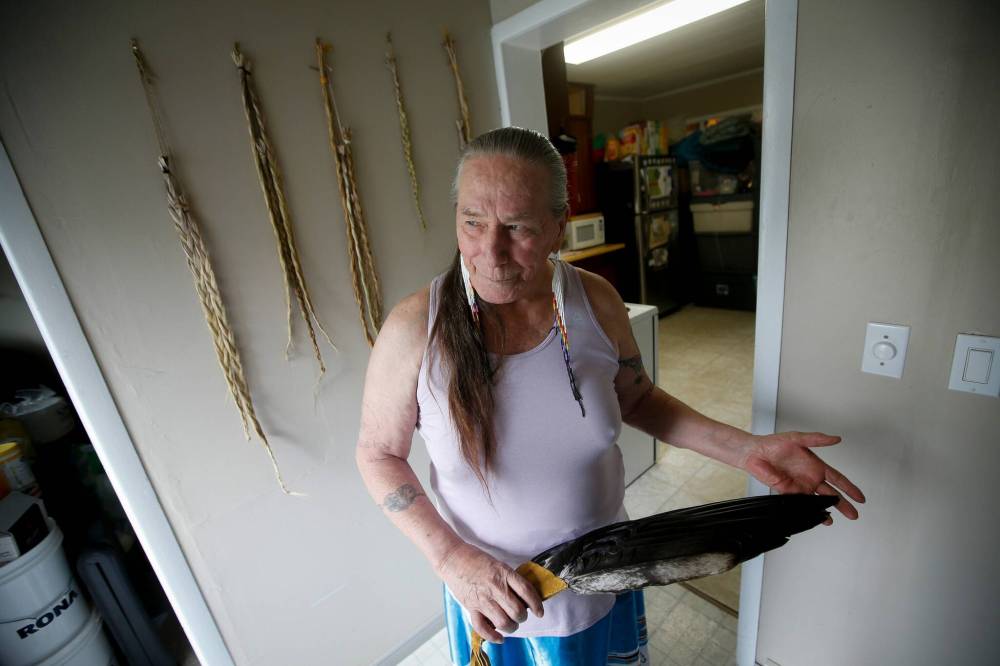
Her sobriety lasted for four decades. But that changed one evening in 2015, when she was at a new partner’s place watching TV.
“She came and sat down and asked what I was watching, and I said, ‘I just got a craving; I need a fix.”
The next morning her partner called to tell her she had found drugs.
“I walked from Young Street to William Avenue, and the whole time I knew what I was doing was wrong. I knew that I was going to be back in the gutter, where I was 42 years ago,” Nolin says.
Nolin shot up crystal meth. The process was different than when she used all those years ago — no need to wrap a belt around her arm, or use a cigarette filter to take the impurities out of the drugs. The dealer helped Nolin with her rig (needle) and injected her.
“As soon as she injected me it was like — you know how in Walt Disney films they show all those demons coming out of a villain? That’s what it felt like. As soon as I felt it, I knew I was back in the gutter again.”
Nolin struggled in the grips of addiction for a year-and-a-half. She fell into poverty and homelessness and turned back to the streets as a means to an end. She remembers her last hit, one that nearly killed her.
“I was at a dealer’s place one night, she had gone to reload — to get more drugs — but there were two needles on the table that her boyfriend had prepared,” Nolin says.
She took one of the needles, but knew something was wrong as soon as she injected herself.
“I was paralyzed and that’s the last thing I remember that night.”
“As soon as she injected me it was like – you know how in Walt Disney films they show all those demons coming out of a villain? That’s what it felt like. As soon as I felt it, I knew I was back in the gutter again.”– Charlotte Nolin
Nolin woke up in the hospital the next day. She was battered and had bruising down her back and legs. The doctors and police questioned her, trying to piece together what happened but her memory was blank.
She later learned, from a girl who was at the house, that she had been beaten, raped and left for dead.
It was a life-altering moment, one that gave her strength to face down her addictions and to continue on the journey to who she really was.
She completed detox and then took part in a 21-day treatment program at the Ste. Rose treatment centre. On the last day, as she was preparing to be discharged and facing a return to homelessness, a caseworker found Nolin an Addictions Foundation of Manitoba placement, until she could move into the North End Women’s Centre.
While at the centre, Nolin became a den mother to some of the girls in the facility. She would prepare Sunday night dinners and help other women learn to cook.
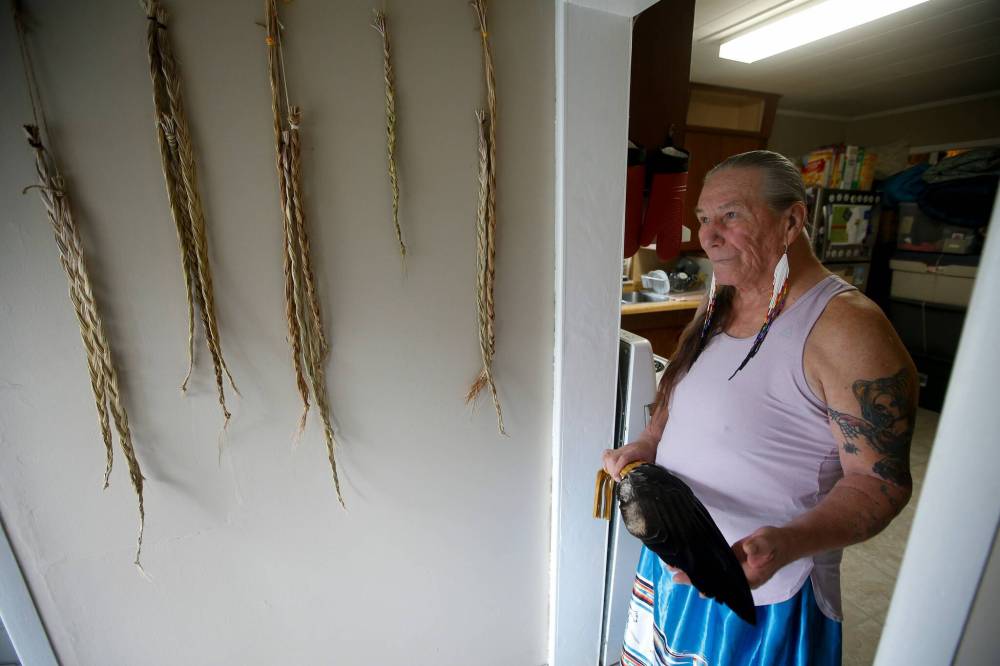
“In 2015-16, I used to do a lot of makeup and dress to the hilt. I remember when I was in Ste. Rose, the girls asking me, ‘How come you’re always dolled up and looking fabulous?’ and I says, ‘When I was a little girl, she didn’t get a chance to play,’” Nolin says. “’It’s her turn now.’”
When her time at the centre was over, Nolin moved into her own apartment. It was challenging because it wasn’t a sober living environment.
“I remember something I learned attending AA meetings: stop hanging around the people you were hanging around with. Stop going to those places that you used to. I took those two teachings to heart,” she says.
“I remember my ex calling me up wanting to get back together and I had to say no. I said, ‘I’m going to love you until the day I die but I can’t be with you. I need to think of me.’”
Also while in detox, Nolin decided she was going to transition completely. She started the process with a doctor at Klinic and was approved for surgery in Montreal.
Nolin has dedicated her life to helping other people who have walked similar paths. She has worked in various social service agencies, including Sage House, as well as with the ACT (Assertive Community Treatment) Program at Mount Carmel Clinic. She has worked with University of Manitoba and University College of the North, and sits on several boards, including the Two-Spirit Michif Local.
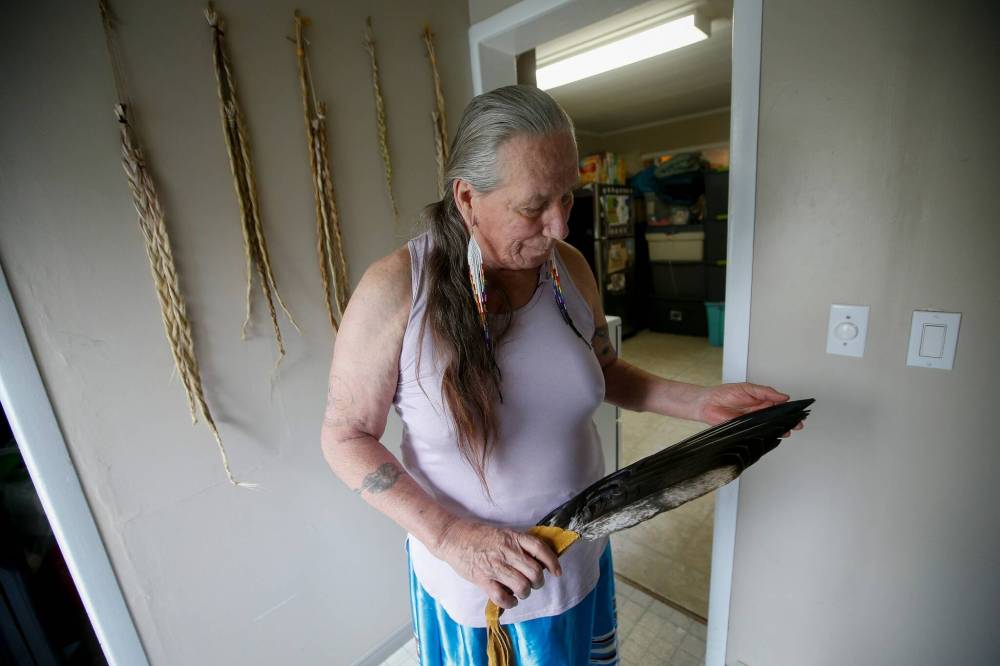
In 2019, Nolin and her cousin Barbara attended a two-spirit gathering in Beausejour where they were doing sweats, sometimes two a day, with participants. Everyone was sitting around a sacred fire as the camp was coming to a close.
“I was walking toward the fire, and they told me ‘It’s time,’” she said. “That was the ancestors talking to me. I walked over to the fire, picked up an eagle fan and I says, ‘My relatives, I have something I need to share with all of you.’ I says, ‘Some of you have known me for years, and you know I’m a sun dancer. They (the ancestors) told me as I was walking here to the fire that it’s time. That’s all they said: it’s time…
“(Barbara’s) eyes just lit up. She knew what I was talking about, and I said, ‘It’s time for me to lead our people in sun dance. We’re going to have our own two-spirit sun dance.”
The first ever two-spirit sun dance will happen this summer on a little piece of land they’ve purchased near Portage la Prairie, called Medicine Wolf Healing Place, providing the site is ready.
Looking back at the little boy who found solitude on the banks of the Rat River while escaping abuse and loneliness, Nolin says she honours the person she used to be.
“All the teachings I received, I received when I was ‘he’ and now I carry those teachings and share them with other people. He taught me everything I know.
“Once we realize who we are as human beings — also when we realize who we are as Indigenous people — our life changes. Life has such a beautiful platter of gifts to give us if we allow it to.”
shelley.cook@freepress.mb.ca





